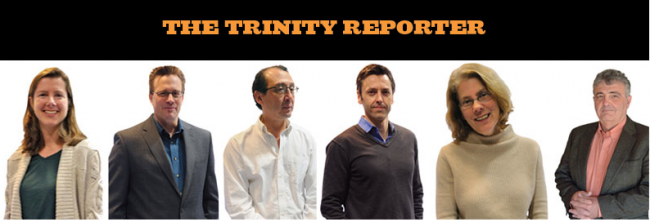Home » European History (Page 4)
Category Archives: European History
Prof. Cocco Discusses New Book
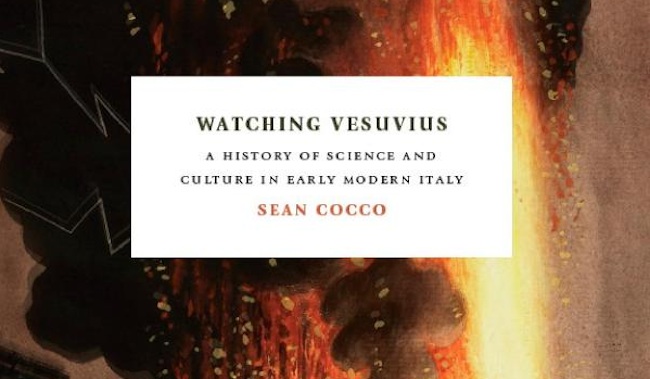
In March, Prof. Sean Cocco of the History Dept. gave an audio recorded interview for New Books in Science, Technology, and Society (NBSTS), which aims for a broadly interdisciplinary coverage of recently-published books in science studies.
According the website: “The story starts on a high-speed train and ends with six men in a crater, with hundreds of years and a number of explosions in between. Sean Cocco’s rich new book uses Vesuvius as a focal point for exploring the histories of natural history, travel, observation, imaging, astronomy, and many other aspects of the places and identities of early modern history. Watching Vesuvius: A History of Science and Culture in Early Modern Italy (University of Chicago Press, 2013) pays special attention to the many resonances of emplacement and locality, and to the agency of the Vesuvinan landscape, as it explores the continuities and transformations in the seventeenth and eighteenth century volcanic landscape. Volcanology emerged along with Neapolitan identity while volcanoes became emblematic of the south in the writings of European travelers: rumbling, unpredictable, given to heated eruptions. Cocco’s account shows us the beauty of these transformations as they were embodied in paintings, poems, letters, and other media. Scholars and enthusiasts of the urban and political history of Europe will find much of interest here, as will readers interested in the history of vernacular understandings of nature.”
Listen to the interview HERE.
LECTURE: Beirut – The Port That Became an Educational Capital
By Duncan Grimm ’15
Thursday, February 14, at the Smith House, Trinity alumna Betty Anderson ’87, Associate Professor of History at Boston University delivered a well-attended lecture on Beirut, Lebanon’s capital city. Presented by the History Department, the International Studies Program, and the Co-Curricular Initiative on Cities, Anderson described how a minor city on the Mediterranean shore became a major trading hub and hotbed of learning throughout the latter half of the nineteenth, and majority of the twentieth centuries, reinvigorated recently in the decades following the Lebanese Civil War.
Today, Beirut is Lebanon’s largest port, responsible for much of the goods that pass in and out of the country. The role of education in this extraordinary urban growth is not lost on Professor Anderson, and is addressed in her 2011 book The American University of Beirut: Arab Nationalism and Liberal Education. Initially seeking to uncover how students of AUB became politicized, Anderson soon discovered that the story of the University lay in Protestant missionary tradition and international intrigue between European nations and the Ottoman Empire.
Meet Team Thesis AY2012/13
 By: Daniel Morgan (History major, Class of 2013)
By: Daniel Morgan (History major, Class of 2013)
Is there anything more quintessential to the education of young historians than the thesis exercise? Writing a two semester thesis has long been a staple of the liberal arts curriculum, and rightly so. Through this labor of love, a history major puts all of his or her skills to the test (from critical and analytical reading to the development of a cogent and articulate argument) and ultimately produces a work which adds to the collective body of Trinity scholarship. The History Department thesis writers for the class of 2013 are (alphabetical by last name): Kyle Loder, Kathleen McKenna, Francis Russo, and Emma Sternloff. This writer is also a thesis writer for the 2013 year – however, I would like to step back after this brief introduction, and let my colleagues speak for themselves. I have asked each of this year’s thesis writers to comment briefly on writing a history thesis, as well as their opinions on history scholarship in general.
(more…)
Mussolini’s Battle For The Roman Past: The Ancient Redesigned

By Duncan F. Grimm (History major, class of 2015)
Welcome to Rome, the Eternal City of many layers and rich history. Despite ages of construction and destruction the city today appears ingeniously planned. A lesser known, or discouraged fact, is that Mussolini and his vision for Rome created this city we experience today. On Thursday, November 1, Professor Borden W. Painter, Jr. (Trinity College ’58) enlightened an audience at the Center for Urban and Global Studies of Mussolini’s Rome, and how the self-proclaimed Marshal of Empire changed the city’s urban landscape. In the 1920s and 1930s his dream of creating a new Imperial Rome completely redesigned the city that we enjoy today. “Mussolini fought many battles,” Painter said, and “he identified chiefly with Augustus.” From 1922 to 1943 Italy was a fascist state; understandably, immediately after the Second World War there was an immediate backlash against all things fascist. In the 1970s and 1980s however, individuals began to adopt a more eclectic view of Il Duce’s Rome–it may be possible to have some good come out of a bad regime.
(more…)
“Some Dark Age!” Thursday Common Hour Lecture: Kings, Knights, Poets, and Bankers by Richard W. Kaeuper
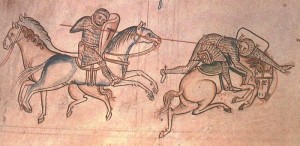
By Duncan F. Grimm (History major, class of 2015)
Thursday, 18 October, 2012 – Professor Richard W. Kaeuper of the University of Rochester discussed the Middle Ages with the Trinity community, asking the leading question that at one time or another all historians must face: Why is it important to study the past? While this question seems to plague (no Medieval pun intended) many academics, Kaeuper embraces the challenge. By the end of his lecture, he had fully illuminated the supposed Dark Ages, painting a picture of a pivotal society that had experienced a renaissance before the Renaissance. One of the most intriguing qualities of the Middle Ages, Kaeuper argued, was that comparative to our time, events seem to take place in slow motion, spanning years if not decades before a conclusion is reached. For historians, this pace of change offers a window often not found in an era so critical to the development of Western civilization and the character of the individual.
(more…)
Events: History Overshadowed: The Annual Philip C. F. Bankwitz Lecture in French History
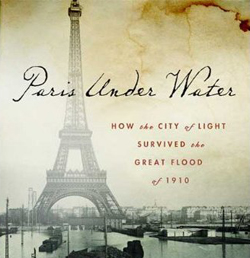
By: Duncan F. McN. Grimm (History major, Class of 2015)
This past Thursday, October 4, Professor Jeffrey Jackson of Rhodes College delivered an informative and engrossing lecture on the flooding of Paris during the frigid winter of 1910. An event lesser known by the intellectual and commoner alike, Jackson further highlighted that this landmark event often becomes eclipsed by the volatile political climate of 20th century France, as well as the two subsequent devastating World Wars. Possibly because of its close temporal proximity to the Great War, some historians wonder if the common suffering and eventual surmounting of the flood led to a convergence transcending politics and social classes that enabled citizens of France to act similarly in the trauma of 1914-1918. Regardless of whether the two disaster-reactions are related or not, the fact remains that intensely divided citizens came together in a time of great danger to themselves and their city to help one another survive. Jackson examines through narrating Paris’ strife how this happened.
In the News: The Cities Initiative

“Fueled by a desire to probe the connections between cities in this country and abroad, Trinity has launched a co-curricular initiative this academic year, “Cities: Global Urban Experience across Time & Space.” The lead professors are Dario A. Euraque, professor of history and international studies, and Garth Myers, Paul E. Raether Distinguished Professor of Urban International Studies. The half-credit course (COLL-131-01) is affiliated with 19 courses having urban themes. They include seven first-year seminars.
(more…)
History Faculty featured in The Trinity Reporter (Summer 2012)
Brianna Diaz of the Trinity Reporter (Spring/Summer 2012) published a feature on 6 faculty members of History Department to discuss writing history. She writes: “In 2012, four faculty members from Trinity’s History Department expect to publish new books. Additionally, two books published by history faculty during the past few years continue to be met with critical acclaim and translated into new languages. The Reporter asked each of these faculty members to comment on their books.” Read entire feature HERE.
(more…)
Lecture: “The Tragedy of Leon Trotsky”
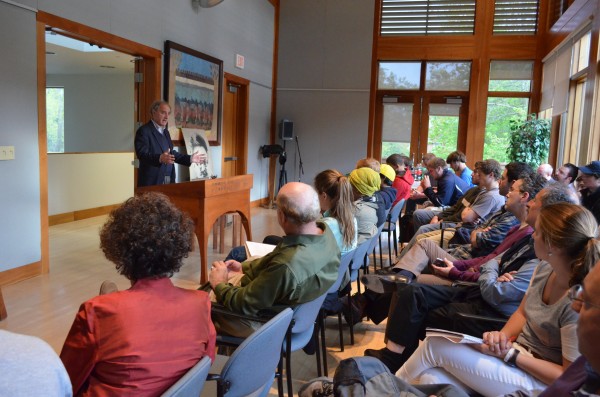 By Jacob Prosnit (Class of 2012)
By Jacob Prosnit (Class of 2012)
On Wednesday, April 25th, the Jewish Studies Department and the History Department sponsored a lecture by Joshua Rubenstein entitled, “The Tragedy of Leon Trotsky{. Rubenstein works for Amnesty International and is a long-time associate of the Davis Center for Russian and Eurasian Studies at Harvard University. His latest book, Leon Trotsky: A Revolutionary’s Life was published at Yale University Press in October 2011 and was the basis for the talk. Among many things, Rubenstein discussed Trotsky’s personal life, his rise to power with Lenin, his momentous struggle for power against Stalin and his famous death in Mexico. The afternoon lecture took place at the Hillel House on Vernon Street and was well attended by students and faculty alike.
(more…)
Prof. John Elukin Speaks to Guided Studies Class
 Jonathan Elukin speaks to his Guided Studies class about the transition of scroll to codex and manuscript to print in late medieval and early modern Europe using sources in the Watkinson. Read more HERE.
Jonathan Elukin speaks to his Guided Studies class about the transition of scroll to codex and manuscript to print in late medieval and early modern Europe using sources in the Watkinson. Read more HERE.

